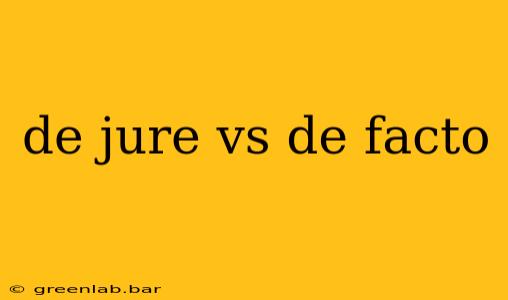The Latin phrases "de jure" and "de facto" are frequently encountered in legal and political discussions, often causing confusion. While both relate to the existence of something, they describe fundamentally different aspects of its reality. Understanding the distinction is crucial for comprehending complex legal and social situations. This article will delve into the precise meaning of each term, explore their practical applications, and provide illustrative examples to clarify the differences.
De Jure: The Law's Mandate
"De jure" translates to "by right," "by law," or "according to law." It signifies something that is legally sanctioned, officially recognized, and exists by virtue of the law. A de jure situation reflects the formal legal framework, irrespective of whether it's actually implemented or followed in practice. It represents the ideal or intended state of affairs as defined by legal statutes, regulations, and constitutional provisions.
Examples of De Jure Situations:
- A de jure government: This refers to a government that is legally established and recognized as having the authority to govern a particular territory. This is in contrast to a government that holds power but lacks legitimate legal basis.
- De jure segregation: Although abolished in many countries, historical examples of de jure segregation involved laws explicitly mandating racial separation in public facilities, education, and other aspects of life. The legality of these practices doesn't negate their moral wrongness.
- De jure ownership: This refers to legal ownership of a property, documented and protected by law, irrespective of who might be in physical possession.
De Facto: The Reality on the Ground
"De facto" translates to "in fact," "in practice," or "as a matter of fact." It describes something that exists in reality, regardless of its legal status. A de facto situation is what is actually happening, even if it contradicts or violates the law. It reflects the practical, observable reality, not necessarily the ideal dictated by legal frameworks.
Examples of De Facto Situations:
- A de facto government: This is a government that controls and governs a territory, but lacks formal legal recognition or legitimacy under international law. Such governments might emerge after a coup d'état or during periods of civil unrest.
- De facto segregation: Even after the abolition of de jure segregation, de facto segregation can persist through residential patterns, school zoning, and other societal factors that lead to racial or ethnic separation in practice.
- De facto control: This implies actual control over a resource or territory, even if legal ownership is disputed or unclear. For example, a company might have de facto control over a market even if it doesn't hold a legal monopoly.
Key Differences Summarized:
| Feature | De Jure | De Facto |
|---|---|---|
| Meaning | By right, according to law | In fact, in practice |
| Basis | Legal framework, statutes, regulations | Actual state of affairs, observable reality |
| Emphasis | Legality, official recognition | Reality, practical existence |
| Relationship to Law | Conforms to the law | May or may not conform to the law |
Conclusion:
Understanding the distinction between "de jure" and "de facto" is crucial for accurately analyzing legal, political, and social phenomena. While "de jure" focuses on the legal ideal, "de facto" highlights the practical reality. Often, these two concepts coexist, sometimes in harmony, and sometimes in stark contrast, revealing important insights into the complexities of how law interacts with actual practice. By recognizing the differences between what is legally mandated and what actually occurs, we gain a more nuanced understanding of the world around us.

